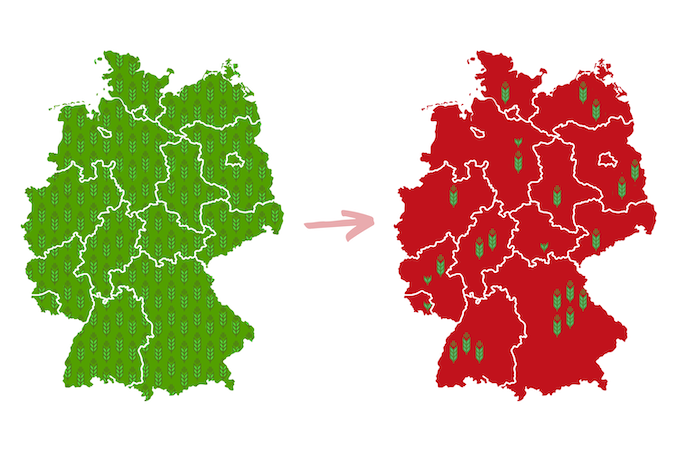Non-GMO foods could be a thing of the past

In the future, organic areas could be the only GMO-free areas in Germany. This would also reduce the selection of GMO-free foods. There is currently a debate in Brussels about new genetic engineering law: On January 24th, the EU Environment Committee will vote on the EU Commission's proposal for deregulation, and the debate will then end up in the EU Parliament. Current plans stipulate that all types of genetic engineering will no longer have to be labeled in the future - so-called “new genetic engineering” such as CRISPR/Cas will be exempt from labeling and risk assessment. Bioland uses a map to illustrate what this would mean for the cultivated areas in Germany.
Today, German cultivation areas are GMO-free. This would change suddenly if genetic engineering law were deregulated. According to the current status of the discussion, only organic farming would be guaranteed to be GMO-free. This corresponds to around 1,9 million hectares in Germany – around 11 percent of the total agricultural area.
“The map illustrates what is at stake: in the future, only a small amount of GMO-free cultivation will be possible in Germany,” explains Bioland President Jan Plagge. “What starts in the field then extends to the grocery shelves. The supply of GMO-free foods is becoming scarcer, only organic foods remain free of them. This is neither fair for the many consumers who want GMO-free food, nor is it in the interests of conventional farmers who farm without GMOs. And it is an unreasonable expectation for organic farmers and organic producers, because in the future they will have to put in enormous additional effort to ensure and prove that their food is free of genetic engineering.”
About the map display / “no forced happiness for organic farming!”
The current situation is shown on the left: In Germany, no genetic engineering is cultivated on agricultural land, as the strict requirements of EU genetic engineering law prevent this. The figure on the right shows what remains of GMO-free cultivation in this country if EU genetic engineering law were to be deregulated to the extent that labeling for certain types of genetic engineering would no longer be mandatory: only the organic areas would then still be guaranteed to be GMO-free.
“Of course, this only applies if organic farming remains closed to all types of genetic engineering and corresponding coexistence regulations apply. Recently there was even a particularly bold demand from the EPP group to open up organic farming to this high-risk technology. We Bios would like to forego this forced happiness, for which no majority could be found even within the parliamentary group,” said Plagge.
The number and shape of the ears symbolize the percentage of organic area in the respective federal state: Baden-Württemberg 14,5%, Bavaria 13,4%, Berlin 18,8%, Brandenburg 16,8%, Bremen 33,6, 11,5%, Hamburg 16,5%, Hesse 14,8%, Mecklenburg-Western Pomerania 5,7%, Lower Saxony 6,3%, North Rhine-Westphalia 12,9%, Rhineland-Palatinate 20,8%, Saarland 9,8% , Saxony 9,8%, Saxony-Anhalt 7,9%, Schleswig-Holstein 7,6%, Thuringia XNUMX%. Many federal states are lagging behind their own organic land targets, as the Bioland state ranking shows.
At the political level, Bioland is committed to ensuring that genetic engineering in Europe continues to be strictly regulated and that the precautionary principle is maintained. On www.bioland.de/gentechnik The association provides information about the current status of the discussion, possibilities for civil participation and explains the background.
Broad alliance protests against genetic engineering deregulation
On January 20th, Bioland and a broad alliance took the demand for maintaining strict regulation of genetic engineering to the streets at the “We're fed up!” demonstration in Berlin. Bioland invites everyone who supports sustainable agriculture to join the demonstration.
To the Bioland Association
Bioland is the most important association for organic farming in Germany and South Tyrol. Around 10.000 companies from production, manufacturing and trading operate according to the Bioland guidelines. Together they form a community of values for the benefit of people and the environment.
